If you’ve got cash burning a hole in your pocket and you’re looking for the best exercise bikes that money can buy, we salute you. Congratulations on your wealth, please adopt me. As for those on a budget, you can still find a high-quality exercise bike without selling the farm. Quality exercise bikes under $1,000 exist, and many offer similar comforts to what you’ll find on big-ticket purchases, such as durable builds, Bluetooth compatibility, and the convenience of boosting aerobic capacity and burning calories from the comfort of your home. (1)
While introducing an indoor bike under $1,000 into your home can be a worthwhile investment, it’s important to understand your options in comparison to what you’re looking for. Do you need back support while you cycle? What kind of technology would help your training? How much space do you have available? Considering these questions, our team of testers spun our wheels on 30 of the market’s most popular exercise bikes to bring you our top seven choices for the best exercise bikes under $1,000. Here are our top picks.
The 7 Best Exercise Bikes Under $1,000 of 2026
- Best Overall Exercise Bike Under $1,000: Schwinn IC4
- Best Air Bike Under $1,000: Assault AirBike Classic
- Best Exercise Bike with Screen Under $1,000: NordicTrack Commercial VU 29
- Best Exercise Bike Under $1,000 for Small Spaces: Yosuda Magnetic Exercise Bike
- Best Recumbent Bike Under $1,000: Schwinn 290
- Best Budget Exercise Bikes Under $1,000: Sunny Health & Fitness SF-B1002
- Best Smart Exercise Bike Under $1,000: Mobifitness Turbo Exercise Bike
How We Tested and Chose the Best Exercise Bikes Under $1,000
The BarBend team is filled to the brim with triathletes, former D1 athletes, certified personal trainers, and home workout fanatics. Our jobs are fun. We comb the internet looking for the best exercise bikes, then try them out to see if they’re worth the hype. Our team has ridden on over 30 of the top exercise bikes in an effort to give you our honest feedback and opinion on what’s out there and if it’s worth your money.
To provide the clearest understanding of our testing methodology, we’ve scored categories such as footprint, tech capabilities, adjustability, and dynamic programming on a scale of 1 (that’s bad) to 5 (that’s good). Here are a few key areas we focused on when making our selections.
Durability
Investing in home gym equipment, even when it’s under $1,000, is costly, and if your purchase falls apart before you’ve gotten a satisfying amount of use from it, it can be heartbreaking. To help avoid this sort of devastation, we’ve opted for bikes with durable builds to protect your investment. When making our selections, we looked for tough frames forged from steel and other high-quality materials, as well as warranties that can protect your ride for years to come. When bikes on our list didn’t meet our standards, we made sure to note it.
We also kept our eye on user weight capacities, ensuring our choices could support a wide range of body types and sizes. The standard user weight capacity on exercise bikes is 300 pounds, but our list contains some options that support up to 330 pounds.
[Related: The 9 Best Exercise Bikes for Heavy People]
Price
Exercise bikes can range anywhere from $150 up to more than $2,600. Our mission was to find the best bikes under $1,000 so that users operating within this budget could easily browse the best options in their price range. Value is really important to us, so we made sure to make note of how each bike’s price stacked up against its resistance capabilities, build, included features, and adjustability.
Intended Use
Upright, air, and recumbent bikes may all have similar functionality, but a customer’s fitness level, goals, and intended training will likely have an impact on which type of bike is best for them. You’ll find all of these bikes on our list, and it’s up to you to figure out which one is best suited to your needs and preferred style of training.
“Air bikes… engage the upper body, thus providing a full-body workout,” says BarBend’s expert reviewer, Amanda Capritto, CPT, CF-L1, CES, CSNC. “Recumbent bikes allow people with mobility limitations or injuries to enjoy cycling, as they are reclined and take pressure off of the hips and back. [And] upright bikes are your typical stationary bikes, which are excellent for high-intensity exercise.”
[Related: Best Air Bikes]
Best Overall Exercise Bike Under $1,000: Schwinn IC4
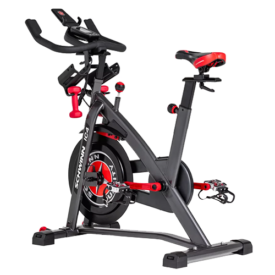
The Schwinn IC4 combines upper and lower body work with its included set of dumbbells and 100 levels of cycling resistance for a complete upper and lower body burn. Dial up your favorite streaming app and hop on, this bike is compatible with JRNY, Peloton, and Zwift.
Specs
- Price: $899
- Dimensions: 51.8’’ H x 54.6’’ L x 30.7’’ W
- Weight: 112lbs
- Resistance: 100 micro-levels of magnetic resistance
- Weight Capacity: 330lbs
Pros
- This top-notch bike has multiple adjustability options, a 40-pound flywheel, and 100 micro-levels of magnetic resistance.
- Bluetooth capabilities allow users to connect this bike to third-party apps like Peloton, JRNY, and Zwift.
- Hybrid pedals have clip-in capabilities for SPD cleats on one side and toe cages for sneakers on the other.
Cons
- In lieu of an HD touchscreen, there is just an LCD display with basic metrics.
- This indoor cycling bike can pair with third-party apps, but connectivity can be limited for specific training metrics.
Strap on your cycling shoes with the $899 Schwinn IC4, our choice for the best overall exercise bike under $1,000. With four-way seat and handlebar adjustability, clip-in and toe cage pedals, and a 40-pound flywheel that supports smooth transitions across its 100 micro-levels of quiet magnetic resistance, this bike can suit any number of fitness goals. Value, durability, customizations, and adjustability all scored a 5 out of 5 with our tester Kate Meier, a certified personal trainer and BarBend editorial member.
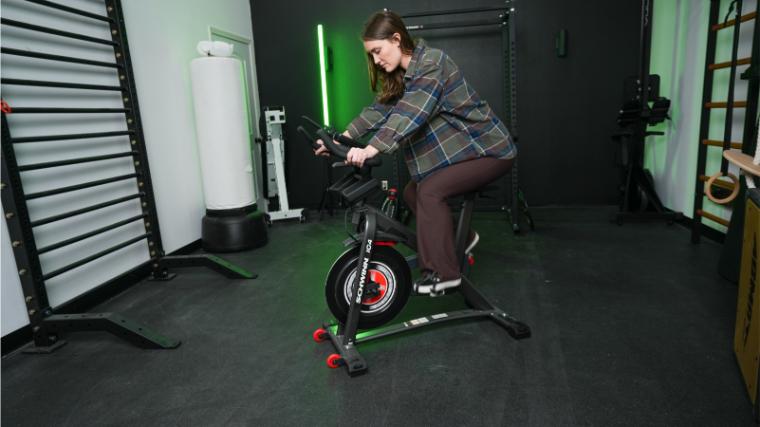
“This bike is a phenomenal deal at under $1,000, and you’re getting a lot for your money. The bike is sturdy and well-built, plus the tech features and conveniences are awesome,” Meier noted. “It also comes with a Bluetooth heart rate armband so you can get even more feedback on your training metrics while you ride.” This connectivity allows you to maintain a fat-burning heart rate zone or track your high-intensity intervals.
Bluetooth pairing capabilities allow users to connect this bike to apps like Peloton, JRNY, and Zwift, which you can then view from your smartphone or tablet stowed on the integrated device holder. However, tech capabilities scored a 4 out of 5. Depending on the app, some connectivity may be limited as detailed in the chart below.
| Speed | Power | RPM | Distance | Heart Rate | iOS or Android | |
| Peloton | No | No | Yes | No | No | iOS |
| Zwift | No | Yes | Yes | No | Yes, with a compatible HR monitor | Both |
| Sufferfest | Yes | Yes | Yes | No | Yes, with a compatible HR monitor | iOS |
| Rouvy | Yes | Yes | Yes | Yes, but may differ from console reading | Yes, with a compatible HR monitor | Both |
Meier gave customizations a 5 out of 5 score. “While there isn’t a built-in touchscreen to stream programming from, there is an LCD screen that allows me to digitally adjust my resistance by pushing up and down on the arrows.”
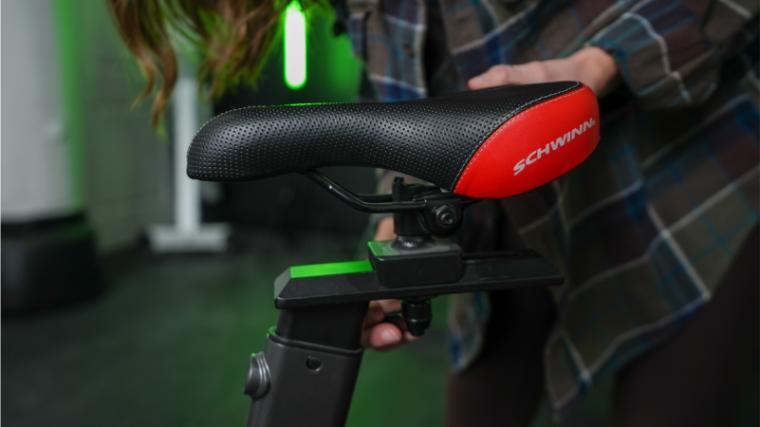
Digital resistance adjustments help users know exactly what level they’re training at, as compared to some indoor bikes with manual turn-knob adjustments that keep users in the dark about their current level of resistance.
Meier also appreciated the stability of this bike while riding out of the saddle or using the included 3-pound dumbbells. “There wasn’t any shake during my ride,” she noted, “For how lightweight and compact this bike is, a 330-pound weight capacity is impressive.” Durability scored a 5 out of 5.
Read our full Schwinn IC4 Exercise Bike Review.
Best Air Bike Under $1,000: Assault AirBike Classic
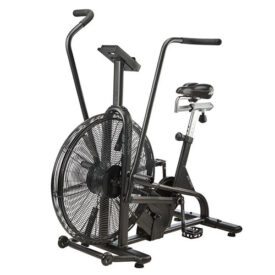
The Assault AirBike is a moderately priced bike with a solid build that features a powder-coated steel frame. It’s an upright indoor bike with moving arms that’s designed to burn calories and integrate seamlessly into cross-training and interval workouts.
Specs
- Price: $699
- Dimensions: 50’’ H x 50.95’’ L x 23.34’’ W
- Weight: 95.6lbs
- Resistance: Air
- Weight Capacity: 300lbs
Pros
- This air bike is built to last with a powder-coated steel frame and 20 sealed cartridge bearings.
- It has steel pegs on either side of the fan, allowing users to rest their feet and push and pull the moving arms for an upper-body workout.
- The LCD display offers seven workouts and can connect to some wireless heart rate monitors.
Cons
- This bike uses a chain-drive system, which can require more upkeep and maintenance than bikes with belt-drive systems.
- Tech capabilities are limited — there’s no Bluetooth connectivity to pair with fitness apps or speakers to play your bops.
“Compared to regular bikes and indoor bikes, air bikes engage more of the body’s musculature due to the moving arms,” notes BarBend expert reviewer Amanda Capritto, CPT, CF-L1, CES, CSNC. “They are great for high-intensity training as well as slow, steady recovery work.” The Assault AirBike Classic, with its durable, powder-coated steel frame and 20 sealed cartridge bearings, is one of the best air bikes we’ve tested, and its $699 price tag earned it a 4.5 out of 5 from our tester, a certified personal trainer.
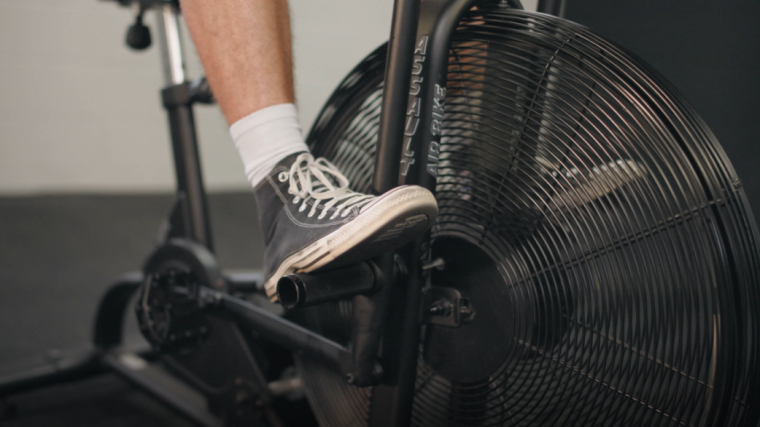
Air bikes are widely used in CrossFit gyms due to their ability to utilize users’ arms and legs for full-body HIIT work. “It’s easy to hop on and get my workout in,” noted our tester, “and while there are a handful of workout programs on the LCD screen, I usually just use manual mode when riding.” Users can also choose to rest their feet on the steel pegs on either side of the fan to focus on their upper body by pushing and pulling on the handles.
“I promise you won’t be bored with the Assault Air Bike, but you might want to be tapping out after a few quick minutes,” notes Jake Herod, BarBend’s expert product tester in the below video review.
The tech capabilities on air bikes tend to be lower than what you might find on spin bikes with large touchscreens and app integration. And while the LCD screen can’t pair with fitness apps, it can connect with some wireless heart rate monitors so you can keep a closer eye on your training metrics. Tech capabilities scored a 3 out of 5.
This affordable, sub-$1,000 price tag does come with a catch in the form of its chain-drive system. “Chain drives, as seen on the Assault Bike series, are noisier and require more frequent maintenance,” notes Capritto. Assault Fitness recommends lubing up the chain four times a year, but this process only takes mere minutes to accomplish.
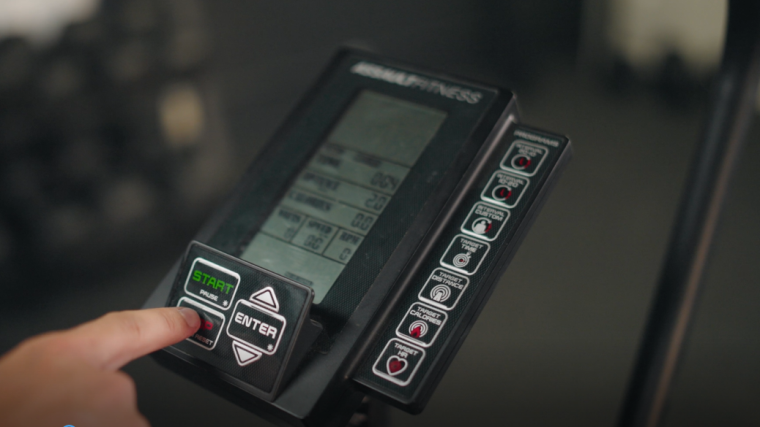
You won’t find a water bottle holder or speakers to play your jams from, which is why conveniences scored a 2 out of 5. But our tester concluded, “I’ve tried a lot of air bikes, and if I was in the market to buy one, it would be this one.”
Read our full Assault AirBike Classic Review.
Best Exercise Bike with Screen Under $1,000: NordicTrack Commercial VU 29
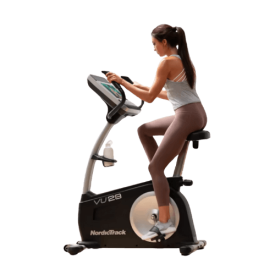
This upright exercise bike offers automatic adjustments to the 24 levels of magnetic resistance, features a 19-pound flywheel, and is fully integrated with iFit and Google Maps™.
Specs
- Price: $999
- Dimensions: 55.29” H x 41.49” L x 24.86” W
- Weight: 115lbs
- Resistance: 24 levels of digital resistance
- Weight Capacity: 325lbs
Pros
- The 14-inch HD touchscreen is integrated with iFIT, allowing users to take thousands of on-demand studio classes and scenic rides.
- The SmartAdjust feature on iFIT can automatically adjust the bike’s 24 levels of resistance to mimic real-world terrain during workouts.
- Google Maps integration allows users to map out their riding course to travel anywhere across the globe.
Cons
- A $39 a month iFIT subscription is necessary to utilize many features of this bike, such as the screen and SmartAdjust.
- The 19-pound flywheel is light, and might not provide as smooth a ride as flywheels over 30 pounds.
- While the seat can adjust up and down, there’s no handlebar adjustments.
The best exercise bikes with screens help users immerse themselves in virtual studio classes and scenic rides around the world, but they often come at a hefty cost that can leave you slack-jawed. The price tag on the NordicTrack VU 29 is a bit easier to swallow, delivering 24 levels of magnetic resistance, a 325-pound user weight capacity, and a 14-inch HD touchscreen with iFIT integration for just $999. Tech capabilities and dynamic programming scored a 5 out of 5.
An iFIT membership grants you access to thousands of immersive virtual spin classes, as well as strength training and mobility classes you can take off the bike. iFIT is also integrated with Google Maps, allowing you to create your own riding route nearly anywhere in the world.
“iFIT is awesome,” said BarBend editorial member and certified personal trainer Kate Meier. “I did a workout in Hawaii and the views were gorgeous.” We also like iFIT’s SmartAdjust feature, which can automatically adjust your resistance based on your ride. “SmartAdjust took control of my resistance and really made me feel like I was climbing the hills I saw on screen,” said Meier.
After a one-month free trial, an iFIT subscription will cost $39 a month, $396 a year for a family membership, or $180 a year for an individual plan. We think this subscription is necessary with this bike to make the most of its touchscreen and SmartAdjust capabilities. However, users who opt out of an iFIT subscription can still access a few iFIT workouts or choose to ride in manual mode.
An oversized cushioned seat, ergonomic foot pedals with adjustable straps, a built-in fan, and a 325-pound user weight capacity provide a comfortable and stable ride. The seat can adjust up and down, though we wish there was an option to tinker with the handlebars, which are in a fixed, nearly vertical position.
This 115-pound bike is one of the most portable and lightweight NordicTrack bikes, though this is partially due to the lightweight 19-pound flywheel, which is lighter than the 30- to 40-pound flywheels we like to see on exercise bikes. Lightweight flywheels can make transitioning through resistance levels less smooth, so we wouldn’t recommend this bike for serious cyclists looking to break PRs in speed trials.
Read our full NordicTrack VU 29 Exercise Bike Review.
Best Exercise Bike Under $1,000 for Small Spaces: Yosuda Magnetic Exercise Bike
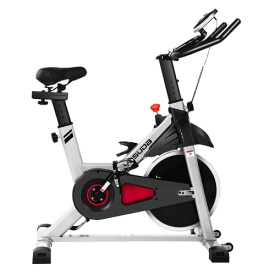
This cost-effective exercise bike can offer excellent low-impact training sessions without breaking the bank. A 35-pound flywheel and belt drive system help operations run smoothly with each pedal, and there’s also a built-in LCD display to track your calories burned, speed, ride time, and distance.
Specs
- Price: $439.99
- Dimensions: 45’’ H x 40’’ L x 22’’ W
- Weight: 68lbs
- Resistance: Magnetic
- Weight Capacity: 270lbs
Pros
- This Yosuda profile’s footprint is roughly 2 square feet smaller than the average bike we’ve tested.
- At $439.99, this bike is well below the $500 to $1,500 average for exercise bikes.
- The 35-pound flywheel — only 3 pounds shy of what the Peloton Bike offers — is impressive for this price range.
Cons
- Our tester noticed the seat cushion tearing after just a few rides.
- Besides a basic LCD screen, this bike has limited tech features.
The Yosuda Magnetic Exercise Bike is one of the best exercise bikes for small spaces due to its compact footprint of just 6.11 square feet, which is roughly 2 square feet smaller than the average bike we’ve tested. The price is appealing, too — at $439.99, it’s well below the $500 to $1,500 average for upright spin bikes. Footprint, portability, and setup scored a 4 out of 5.
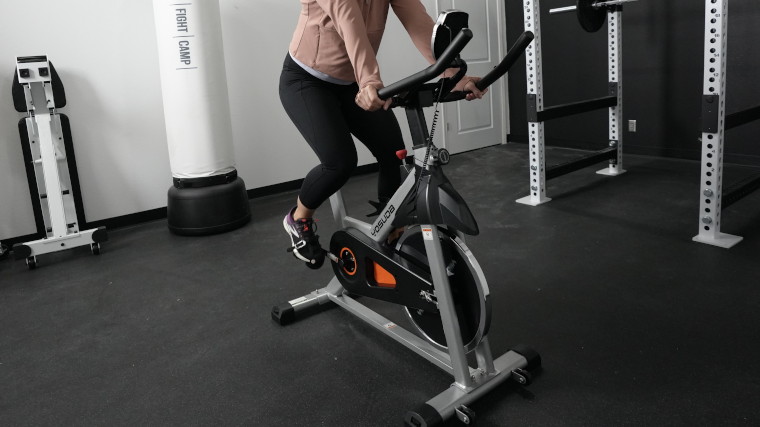
“This bike is pretty compact, so moving it around on the included transport wheels was easy for me,” noted our tester, a certified personal trainer.
Often, budget bikes with compact footprints don’t support the kind of ergonomic fit you’ll find on larger and more expensive rides, so we were happy to find that the Yosuda has both a seat that’s adjustable four ways and handlebars capable of vertical adjustments, allowing for riders with a 25- to 35-inch inseam.
In fact, our tester — who stands 6 feet 3 inches and has a size 13 shoe — had no trouble getting comfortable on the Yosuda. “The adjustability of the seat and toe cages helped me to get into a comfortable position,” they noted, scoring ergonomics a 3.5 out of 5.
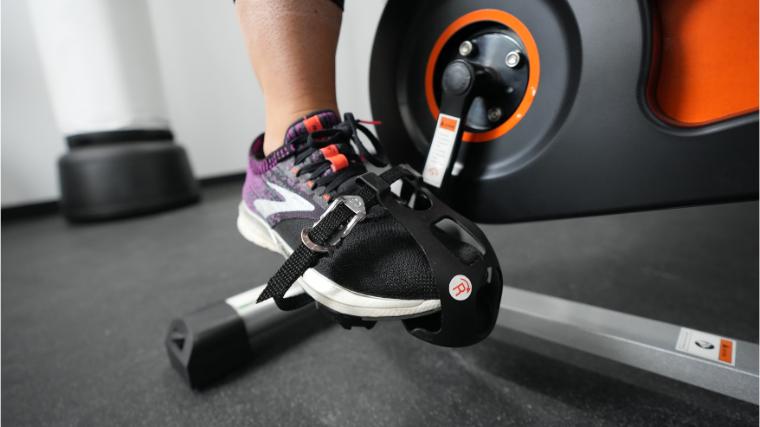
Thanks to the 35-pound flywheel, just 3 pounds shy of the Peloton Bike’s flywheel, “the ride is smooth and super quiet,” mentioned our tester. While the tech is limited to a basic LCD screen, we appreciated the inclusion of a water bottle holder and tablet holder, which allows users to stream entertainment or classes from their mobile device
Durability scored a 2.5 out of 5. “This isn’t a bike that’ll last forever,” concluded our tester, who experienced some tears in the seat. Similarly, some customer reviews mentioned their pedals falling off and plastic parts breaking. However, for those looking for a budget-friendly ride, “it’s a good choice for beginners that won’t break the bank.”
Read our full Yosuda Exercise Bike Review.
Best Recumbent Bike Under $1,000: Schwinn 290
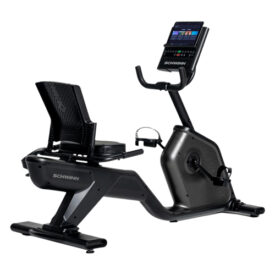
This recumbent bike offers comfort and modern conveniences, highlighted by the padded and ventilated seat, Bluetooth connectivity for your devices, and a tablet holder for streaming.
Specs
- Price: $999
- Dimensions: 47” H x 66.4″ L x 28″ W
- Weight: 108lbs
- Resistance: 25 levels of magnetic resistance
- Weight Capacity: 330lbs
Pros
- This recumbent bike’s padded seat and ventilated backrest offers added support for senior athletes or those with back pain or limited mobility.
- An easy-to-reach media shelf can hold your phone or tablet so you can stream entertainment or classes while on your ride.
- Bluetooth compatibility allows this bike to be paired with apps like JRNY and Zwift.
Cons
- Those tight on space may take issue with this bike’s footprint of 12.91 square feet.
- The flywheel is only 8.16 pounds — well below what we’d recommend.
The Schwinn 290 is our choice for the best recumbent bike under $1,000, as we like its reclined and ventilated backrest and Bluetooth compatibility. An updated version of the Schwinn 270, the 290 is now compatible with the JRNY app.
Recumbent bikes are often seen in physical therapy offices due to their ease of use and supportive reclined positioning. The 290’s padded seat, ventilated backrest, and step-through design can provide additional support for senior athletes, those struggling with back pain, or anyone with limited mobility.
[Related: The 6 Best Recumbent Bikes for Seniors]
Its 7-inch LCD monitor delivers training metrics and comes pre-loaded with 13 programs to help you work up a sweat and develop a routine. While you won’t find a built-in touchscreen for streaming, it is compatible with Bluetooth so you can pair the bike with apps like JRNY and Zwift. Plus, the built-in media shelf can hold your mobile device while you stream classes or entertainment.
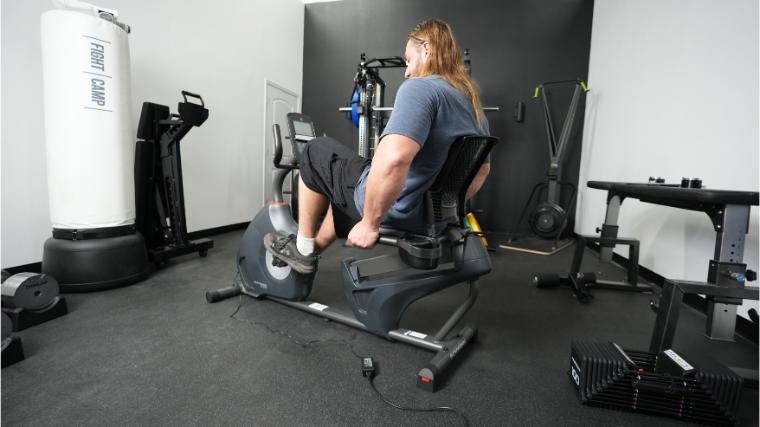
The bike comes with a free 2-month membership to JRNY, an app with on-demand classes, scenic rides, and adaptive suggested workouts based on ability. “JRNY tracks your progress and milestones,” noted our tester, a CrossFit Level 1 coach. “Plus, there are curated music playlists for your workouts — though I didn’t love the tunes.”
After your trial, a JRNY mobile-only membership costs $11.99 a month or $99 for the year. However, some customers have struggled with this bike’s connectivity. One review noted, “…Despite several attempts, [I] cannot get JRNY installed, very disappointing.”
At 12.91 square feet, the 290 is a big piece of equipment — most recumbent bikes we’ve tested measure around 10 square feet. Also, the 8.16-pound flywheel is well below the 30- to 40-pound flywheels we like to see on exercise bikes at this price range. As such, we wouldn’t recommend this bike for serious cyclists or those looking to win any speed trials.
However, it may be perfect for senior riders and individuals with back pain and mobility issues who are trying to stay active.
One reviewer mentioned, “I recently had knee ligament replacement surgery. The Schwinn 290 is really helping with my knee flexion and leg strengthening. I find it easy to use and as effective if not more so than the high-end recumbent bikes at the gym.”
Read our full Schwinn 290 Recumbent Bike Review.
Best Budget Exercise Bike Under $1,000: Sunny Health & Fitness SF-B1002
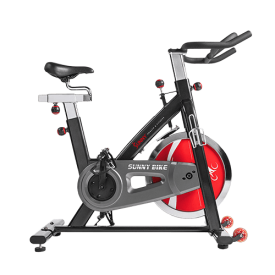
This bike's 49-pound flywheel is one of the largest we've seen on a consumer indoor cycle and will help you build momentum while keeping your ride smooth. The transport wheels are also large and durable, so you can move tip this bike and move it out of the way when your workout is over.
Specs
- Price: $399
- Dimensions: 44.8” H x 54” L x 19” W
- Weight: 113lbs
- Resistance: Friction
- Weight Capacity: 275lbs
Pros
- At just $399, this budget bike manages to have a 49-pound flywheel — one of the heaviest we’ve seen.
- Four-way seat adjustability and two-way adjustable handlebars can accommodate riders between 5 feet 2 inches and 6 feet 1 inch.
- This bike is so durable, I managed to roll it on its transport wheels a mile on city streets without any damage.
Cons
- There’s no tech on this bike to help track training metrics.
- It has no device holder for those who are interested in streaming classes and content from their phones or tablets.
- Friction resistance, as compared magnetic resistance, requires more maintenance.
The Sunny Health and Fitness SF-B1002’s $399 price tag, heavy flywheel, and sturdy build are why it’s our pick for the best budget exercise bike under $1,000. When I was unemployed and looking for an affordable means to train for bike-camping expeditions, this bike caught my eye. I’ve owned this bike for the past three years and have ridden more than 1,000 miles on it. I scored its value a 5 out of 5.
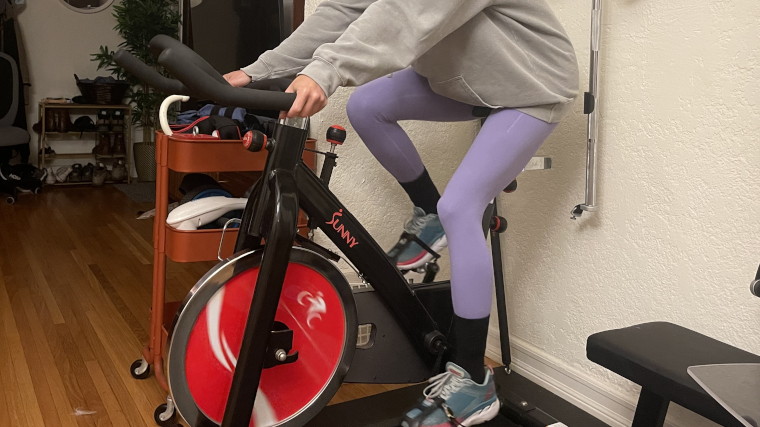
The 49-pound flywheel is incredibly impressive for a bike at this price point — for comparison, the top-of-the-line Peloton Bike only has a 38-pound flywheel. A heavier flywheel helps to maintain momentum, similar to the ride experience on a road bike, and I’ve experienced nothing but smooth transitions during sprints and when I’ve increased the resistance out of the saddle.
Cheaper products tend to have shorter life spans, but this bike is built to last. When I moved to a new apartment and didn’t want to take the bike apart to fit it into my car, I just tipped it onto its transport wheels and pushed it a mile down the road to my new spot. Durability and portability scored a 5 out of 5.
[Related: The 8 Best Exercise Bikes for Beginners]
However, this bike uses a friction resistance system, so users will want to make sure to keep the flywheel greased and replace the leather friction pad when it wears out. I lube up the flywheel once a year and have yet to replace my friction pad.
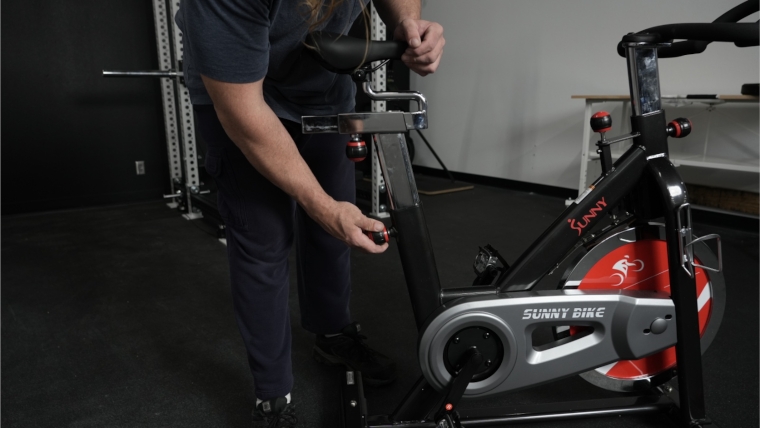
Saving cash won’t come at the cost of an ergonomic fit with this bike’s adjustability, which I scored a 5 out of 5. The seat has four-way adjustability and the handlebars can move up and down. This allows access to riders between 5 feet 2 inches and 6 feet 1 inch.
Before you get too excited, know that tech capabilities on this bike are non-existent, which may be good for beginners looking for a simple and quality ride. There is no touchscreen, no LCD display to track stats, and no Bluetooth connectivity. There isn’t even a media holder to stream content from your phone or tablet, though you could always invest in a $20 mount. Tech capabilities scored a 2 out of 5.
Best Smart Exercise Bike Under $1,000: Mobifitness Turbo Exercise Bike
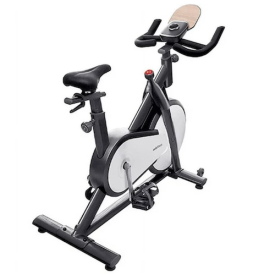
If you're looking for a budget-friendly exercise bike, you've found your match. Plus, this bike can support users up to 330 pounds.
Specs
- Price: $220
- Dimensions: 42.5” H x 44.5″ L x 20″ W
- Weight: 92lbs
- Resistance: 32 levels of magnetic resistance
- Weight Capacity: 330lbs
Pros
- This bike pairs with the free Mobi Fitness app to provide detailed training stats, spin classes, and gamified cycling you can view from your phone or tablet.
- Digitally control your resistance from the LCD screen dial control or through your Apple Watch.
- The bike’s seat has six-way adjustability, including an option to tilt the seat up or down.
Cons
- While the app doesn’t require a subscription (hooray!), the programming isn’t as vast or as entertaining as Peloton or iFIT.
- The 1-year parts and 2-year frame warranty is worrisome compared to exercise bikes with 5- to 10-year warranties.
Smart home fitness technology has taken the world by storm, with Peloton, Tonal, and NordicTrack leading the charge for connected equipment that can power up your training. However, these types of machines often carry hefty price tags, limiting use to gazillionaires. At just $220, the Mobifitness Turbo Exercise Bike is our choice for the best smart exercise bike under $1,000 because of its free app, Bluetooth connectivity, sleek (smart) design, and 32 levels of quiet magnetic resistance.
[Related: The Best Smart Home Gyms For Free Weights, Small Spaces, And More]
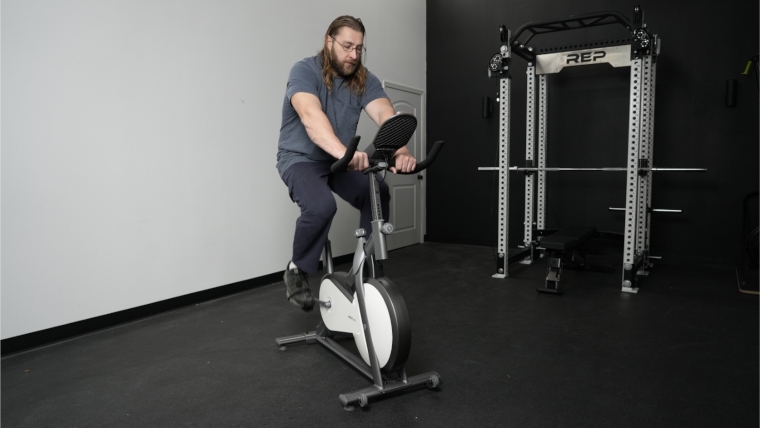
This bike pairs with the free Mobi Fitness app. A free app is rare in this space — most smart bikes come with apps that require a monthly subscription that tends to range between $19 and $44. “There isn’t a screen or tablet on this bike, but you can connect your phone or tablet to the app and to the bike for an integrated workout experience,” noted our tester, a CrossFit Level 1 coach, who gave tech capabilities a 3.75 out of 5.
The Mobi Fitness app is available for iOS and Android, and it provides detailed training stats, workout plans, spin classes, and gamified cycling experiences. “This programming is pretty cool since it’s free, however, the class variety and quantity pales in comparison to something like Peloton,” our tester noted.
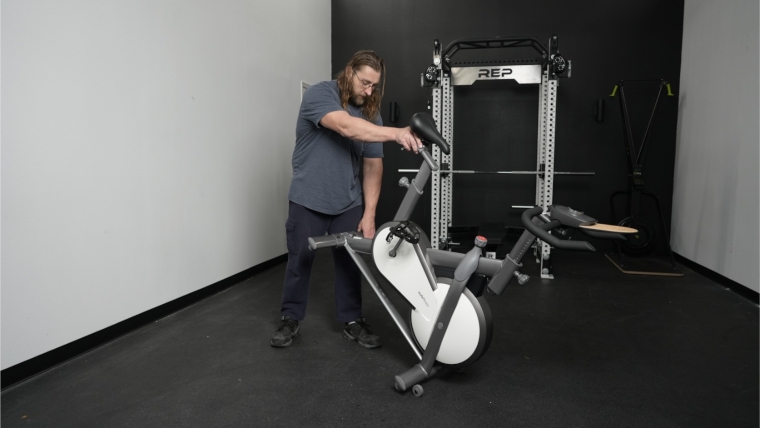
Of course, there’s plenty we like about the bike itself. It has 32 levels of magnetic resistance, for one, and you can control them via a digital dial or a connected Apple Watch. We also like that it can support riders up to 6 feet 5 inches thanks to two-way handlebar adjustments and six-way seat adjustments, which is more than we’ve seen on almost any bike. This seat can move vertically, horizontally, and can also tilt up and down. Customizations scored a 4.5 out of 5.
“This bike is super sturdy when I’m riding,” noted our tester, “but the 1-year warranty is worrisome, since who knows how well everything will hold up over time.” The 1-year parts and 2-year frame warranty are disappointing, but perhaps to be expected at this price point. Ideally, we’d like to have seen something closer to a 5- or 10-year warranty. For this, durability scored a 3.75 out of 5.
What to Consider Before Buying an Exercise Bike Under $1,000
“First, you’ll need to decide what type of exercise bike you want: recumbent, upright (like a spin bike), or an air bike,” mentions Amanda Capritto, CPT, CF-L1, CES, CSNC. After that, you’ll need to figure out what you want from your exercise bike and how much you’re willing to spend. Are you looking for Bluetooth connectivity to have better access to your training metrics? How much space do you have available to dedicate to a new piece of equipment? Percolate on these questions as you consider what to look for when buying an indoor cycle.
Floor Space
Even when you’re only considering your options, it’s important to know the amount of space you’re working with. We’ve provided dimensions for each of the exercise bikes on this list, so all you need to do is pull out your tape measure and measure your available floor space. This way you can be armed with the information you need to help you make a decision.
Tech Capabilities
“If [tech capabilities] are something you’re interested in, be prepared to shell out a significant amount of cash and also pay for a monthly subscription. Budget-friendly options are available, but comparatively lack in the tech department,” notes Capritto.
Budget-friendly exercise bikes under $1,000 generally won’t provide the range of tech capabilities found on high-end models, but, despite lacking touchscreens of their own, many can link up with your mobile device to support app-based workouts. The bikes on our list provide options to connect and stream programming from apps like iFIT ($39/month), JRNY ($11.99/month), and Mobi Fitness (free!).
Your Needs
Whether you’re looking to build strength in your legs with loads of resistance on a spin bike, or want to tackle some LISS training while recovering from an injury, bringing an exercise bike into your home provides convenience and accessibility to help tackle your goals. (2)
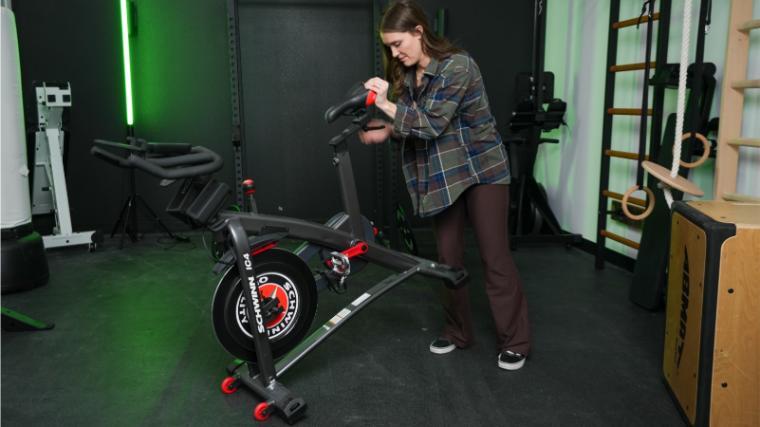
Of course, some exercise bikes are more compatible than others. If you’re dealing with back pain or have limited mobility, a recumbent bike with a step-through design and a backrest would likely be a better fit than your standard upright bike. Air bikes, meanwhile, support a total-body workout with the addition of moveable arms, so those interested in CrossFit training or burning a few extra calories may be best served by a self-powered bike.
Benefits of Exercise Bikes Under $1,000
“Cycling brings an impressive collection of health benefits to the table: cardiovascular health, endurance, stamina, muscular endurance are all improved with cycling, to name a few,” notes Amanda Capritto, CPT, CF-L1, CES, CSNC. Here are some additional benefits of cycling that come along with bringing an exercise bike under $1,000 into your home.
Time Efficient
Getting to the gym takes effort. Packing your gym bag, driving to and from the gym, parking, mingling with the front desk clerk who you’ve known for too long so you can’t ask them what their name is again — these can add up to turn your gym session into an entire chunk of your day. When you have an indoor bike sitting in your living room, you’re reclaiming your time by getting your cardio done in the time it takes to roll out of bed and hop on your ride.
Low-Impact Cardio
When your knees and joints and back start begging you to take it easy during high-impact training sessions (i.e. running outdoors or on a treadmill), indoor cycling is here to save the day (and your body). (3) The low-impact cardio that indoor cycling can provide allows users to get moving and work up a sweat without placing a ton of force on the body. This type of exercise can boost aerobic fitness, tone and strengthen legs, and have positive effects on mood. (4)(5)
[Related: Running on a Treadmill Vs. Running Outside — Which Is Best for Your Goals?]
No Need to Leave the House
Riding a bike outside can be thrilling: seeing the sights, people watching as you cruise down busy streets, avoiding angry drivers who shout the sort of profanities that leave you lying awake at night wondering if you really are a “stupid t@$%! s*$& head!” Bringing an exercise bike into your home can help city dwellers avoid such incidents (and, you know, inclement weather).
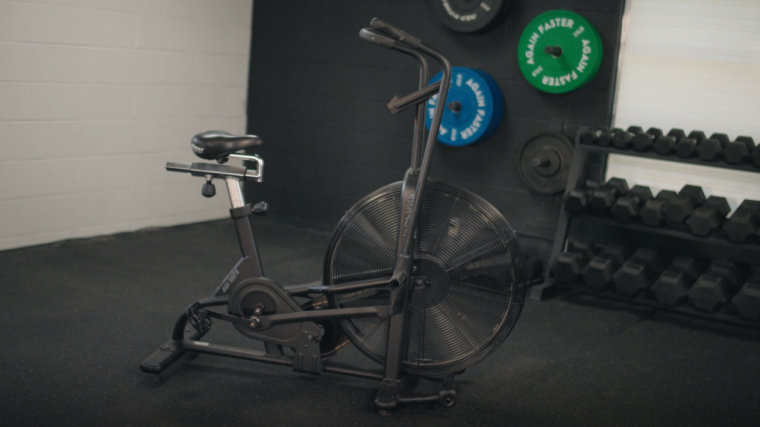
“Many people do not feel safe cycling outside,” says BarBend expert reviewer Amanda Capritto, CPT, CF-L1, CES, CSNC., “Indoor exercise bikes provide access to cycling no matter the weather or outdoor conditions.” And as someone who’s been doored and cursed at while riding around Los Angeles, my indoor bike is my sanctuary when I just don’t have the energy to face the city streets.
How Much Do Exercise Bikes Under $1,000 Cost?
The price range for exercise bikes is expansive, ranging from a few hundred dollars up to almost $3,000 for machines with screens, AI technology, and interactive programming. All of the bikes on our list come in under $1,000, with the higher-priced cycles providing heavy-duty builds and tech features like touchscreens and Bluetooth connectivity to cycling apps. The chart below provides a breakdown of our top choices and their prices.
| Best Overall Exercise Bike Under $1,000 | Schwinn IC4 | $899 |
| Best Air Bike Under $1,000 | Assault AirBike Classic | $699 |
| Best Exercise Bike with Screen Under $1,000 | NordicTrack Commercial VU | $999 |
| Best Exercise Bike Under $1,000 for Small Spaces | Yosuda Magnetic Exercise Bike | $439.99 |
| Best Recumbent Bike Under $1,000 | Schwinn 290 | $999 |
| Best Budget Exercise Bike Under $1,000 | Sunny Health & Fitness SF B1002 | $399 |
| Best Smart Exercise Bike Under $1,000 | Mobifitness Turbo Exercise Bike | $220 |
The most affordable exercise bikes on our list vary. Some choices — like the Yosuda Magnetic Exercise Bike and Sunny Health & Fitness SF B1002 — are basic upright bikes with few bells and whistles. Interestingly, the Mobifitness Turbo exercise bike provides Bluetooth capabilities, but is one of the lowest-priced bikes here. However, its warranty is limited, which makes us wonder about how long this bike can withstand daily use.
The self-powered Assault AirBike Classic is a sturdy mid-range option, and its moving arms can help incorporate a total body-workout into your training routine. However, these types of bikes generally lack screens or options for dynamic programming.
[Related: The 7 Best Exercise Bikes with Moving Arms]
The NordicTrack Commercial VU is our only bike with a screen and integrated training with iFIT. However, this subscription will cost an additional $39 a month after a free 30-day trial. However, the Schwinn IC4 and 290 both offer Bluetooth capabilities and can pair with apps on your phone and tablet.
Types of Exercise Bikes Under $1,000
From upright spin bikes to air bikes to easy-on-the-joints recumbent bikes, we’ve got an option on this list that can give you the type of training you’re looking to do.
Upright Exercise Bike
“Upright bikes are your typical stationary bikes, which are excellent for high-intensity exercise and tech-savvy cyclists who love to take fitness classes,” says BarBend expert reviewer Amanda Capritto, CPT, CF-L1, CES, CSNC. These bikes position the rider in either a vertical position or leaning forward over the handlebars, and they tend to allow the user to stand up out of their seat to mimic hill climbing.
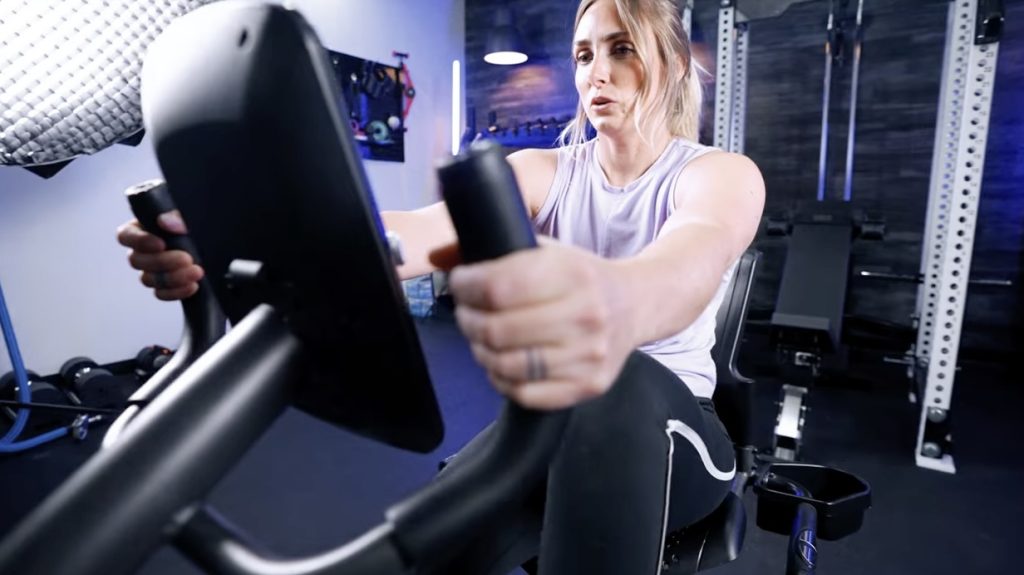
These bikes usually have a weighted flywheel, and you’ll find magnetic or friction-based resistance offerings. Friction resistance can be less expensive, but it can also require more maintenance than magnetic resistance.
Air Bike
“Air bikes differ from recumbent and upright bikes in that they engage the upper body, thus providing a full-body workout,” notes Capritto. These bikes are often used in CrossFit gyms for their ease of use, the inclusion of upper and lower body work, and value as a high-intensity training tool. Air bikes tend to have few bells and whistles and, since they’re self-powered, don’t require electricity.
Recumbent Exercise Bike
“Seniors and individuals with limited mobility may struggle to get on and off of a [standard] exercise bike, in which case a recumbent bike is recommended,” says Capritto. These bikes sit riders in a more reclined position and often feature larger seats and supportive backrests, so users can reap the benefits of cardio without the added stress to their backs and knees.
[Related: Best Recumbent Bikes for Small Spaces, Streaming, Seniors, and More]
Final Word
No matter your fitness level, there’s an exercise bike under $1,000 to help you reach your goals. Our top choices offer a variety of features, from Bluetooth capabilities to touchscreens with integrated programming. While these bikes are less expensive than some higher-end options, pulling the trigger on a purchase can still be nerve-wracking. We’ve made sure to note weight limit, intended use, dimension, resistance type, and other key features so you’re armed with the information to help you make the right decision.
Before buying an exercise bike, users should consider the type of riding they’d like to do. Do you need added back support to create a more comfortable cycling experience? Will tech features aid your training? Are you looking for an option that can incorporate your arms and legs for a total-body workout? As you uncover the answers to these questions, peruse our list to see which bike best suits you.
FAQs
What is the best exercise bike under $1,000?
While there are many great options on this list, our top choice is the Schwinn IC4. This spin bike has a 40-pound flywheel and provides 100 micro-levels of resistance. While it lacks a screen or tablet to stream programming, you can pair this bike with apps like Peloton and Zwift and pedal along to content from your own device.
Are exercise bikes under $1,000 worth it?
Yes! We’ve tried and tested these options and wouldn’t recommend something we thought wasn’t worth your money. However, these options may not provide all of the training intensity, dynamic programming, or tech features you’re after, so users will need to know what they’d like from their bike while cross-referencing this list.
What are the negatives of an exercise bike under $1,000?
While you can expect to save some cash when compared to options that can cost upwards of $2,000, there are some downsides to a sub-$1,000 exercise bike. While every bike has different offerings, keep an eye on warranties, tech capabilities, and touchscreens, as these are the primary things we’ve noticed lacking in bikes at this price range.
References
- Chavarrias, M., Carlos-Vivas, J., Collado-Mateo, D., & Pérez-Gómez, J. (2019). Health Benefits of Indoor Cycling: A Systematic Review. Medicina (Kaunas, Lithuania), 55(8), 452. https://doi.org/10.3390/medicina55080452
- Rissel, C., Passmore, E., Mason, C., & Merom, D. (2013). Two pilot studies of the effect of bicycling on balance and leg strength among older adults. Journal of environmental and public health, 2013, 686412. https://doi.org/10.1155/2013/686412
- Sandmeier R. H. (2000). Osteoarthritis and Exercise: Does Increased Activity Wear Out Joints?. The Permanente Journal, 4(4), 26–28.
- Engels, H. J., Drouin, J., Zhu, W., & Kazmierski, J. F. (1998). Effects of low-impact, moderate-intensity exercise training with and without wrist weights on functional capacities and mood states in older adults. Gerontology, 44(4), 239–244. https://doi.org/10.1159/000022018
- Ligeza, T. S., Maciejczyk, M., Wyczesany, M., & Junghofer, M. (2023). The effects of a single aerobic exercise session on mood and neural emotional reactivity in depressed and healthy young adults: A late positive potential study. Psychophysiology, 60(1), e14137. https://doi.org/10.1111/psyp.14137